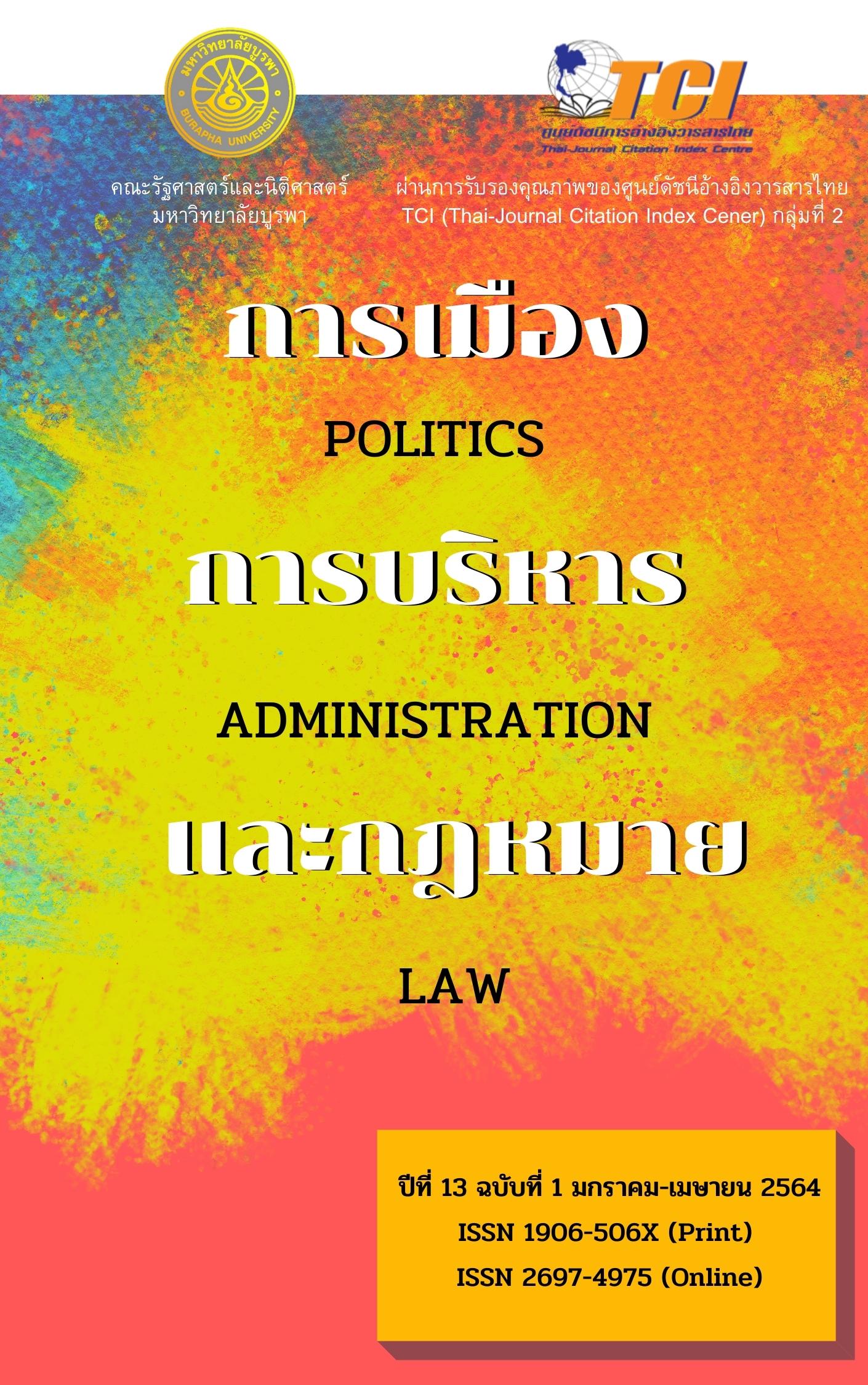การศึกษาหลักการทรงงานในพระบาทสมเด็จพระบรมชนกาธิเบศรมหาภูมิพลอดุลยเดชมหาราช บรมนาถบพิตร เพื่อน้อมนำมาเป็นแนวทางในการปฏิบัติงานสำหรับกิจการเพื่อสังคม
คำสำคัญ:
หลักการทรงงาน, กิจการเพื่อสังคม, วิสาหกิจชุมชนบทคัดย่อ
งานวิจัยครั้งนี้มีวัตถุประสงค์เพื่อศึกษาหลักการทรงงานในพระบาทสมเด็จพระบรมชนกาธิเบศร มหาภูมิพลอดุลยเดชมหาราช ที่ส่งผลต่อความสำเร็จในการปฏิบัติงานสำหรับกิจการเพื่อสังคม (Social Enterprise) และส่งผลต่อปัจจัยแห่งความสำเร็จขององค์กรในสมดุล 3 ด้าน ได้แก่ 1. ด้านสังคม 2. ด้านสิ่งแวดล้อม 3. ด้านเศรษฐกิจ ที่ส่งผลต่อความยั่งยืน โดยการวิจัยในครั้งนี้ เป็นการเก็บข้อมูลจากผู้ทรงคุณวุฒิที่มีความเชียวชาญกิจการเพื่อสังคม (Social Enterprise) วิสาหกิจชุมชน และผู้ที่ใช้หลักทรงงานในพระบาทสมเด็จพระบรมชนกาธิเบศร มหาภูมิพลอดุลยเดชมหาราช ซึ่งสำนักงานคณะกรรมการพิเศษเพื่อประสานงานโครงการอันเนื่องมาจากพระราชดำริ (สำนักงาน กปร., 2559) ได้รวบรวมไว้จำนวน 23 หลักการ ได้แก่ 1) ศึกษาข้อมูลอย่างเป็นระบบ 2) ระเบิดจากข้างใน 3) แก้ปัญหาที่จุดเล็ก 4) ทำตามลำดับขั้น 5) ภูมิสังคม 6) องค์รวม 7) ไม่ติดตำรา 8) ประหยัด เรียบง่าย ได้ประโยชน์สูงสุด 9) ทำให้ง่าย 10) การมี ส่วนร่วม 11) ประโยชน์ส่วนรวม 12) บริการที่จุดเดียว 13) ใช้ธรรมชาติช่วยธรรมชาติ 14) ใช้อธรรมปราบอธรรม 15) ปลูกป่าในใจคน 16) ขาดทุนคือกำไร 17) การพึ่งตนเอง 18) พออยู่พอกิน 19) เศรษฐกิจพอเพียง 20) ซื่อสัตย์ สุตจริต จริงใจต่อกัน 21) ทำงานอย่างมีความสุข 22) ความเพียร 23) รู้ รัก สามัคคี นำมาใช้ในการดำเนินกิจการ ให้ประสบความสำเร็จในปัจจุบัน จำนวน 17 ท่าน โดยใช้เทคนิคเดลฟาย ผลการศึกษาพบว่า ปัจจัยที่ส่งผลต่อความสำเร็จในการปฏิบัติงานสำหรับกิจการเพื่อสังคม (Social Enterprise) ประกอบไปด้วย 1. สร้างรายได้ สร้างอาชีพ สามารถเลี้ยงตัวเองได้อย่างมั่นคง 2. นำวัตถุดิบ หรือสิ่งที่หาได้จากท้องถิ่น มาเพิ่มมูลค่า 3. วิจัยและพัฒนา 4. การเงิน โปร่งใส ตรวจสอบได้ 5. การปรับตัวตามสถานการณ์พร้อมที่เรียนรู้และแก้ไข 6. ใช้ภูมิปัญญาที่มีอยู่ภายในชุมชน นำมาประยุกต์ให้สอดคล้องกับสังคม วัฒนธรรม 7. การวางแผน การบริหารจัดการอย่างเป็นระบบ 8. เสริมสร้างองค์ความรู้ ความเข้าใจ การเรียนรู้ 9. ยกระดับชุมชน ให้เกิดการกินดี อยู่ดี 10. กำไรที่ได้จาการดำเนินงาน นำกลับไปคืนแก่ชุมชน 11. ความสมดุลเพื่อทำให้เกิดความยั่งยืนด้านเศรษฐกิจ 12. ความสมดุลเพื่อทำให้เกิดความยั่งยืนด้านสังคม 13. ความสมดุลเพื่อทำให้เกิดความยั่งยืนด้านสิ่งแวดล้อม
เอกสารอ้างอิง
ลลิต ถนอมสิงห์. (2557). หลักการทรงงานและองค์กรแห่งการเรียนรู้นำไปสู่องค์กรแห่งความยั่งยืน. วารสารวิชาการคณะบริหารธุรกิจ มหาวิทยาลัยเทคโนโลยีราชมงคลธัญบุรี, 9(1), 1-21.
ศักดิ์ดา สิริภัทรโสภณ. (2558). การศึกษากรอบแนวคิดเพื่อการพัฒนาวิสาหกิจเพื่อสังคมในประเทศไทย. วารสารสมาคมนักวิจัย, 20(2), 30-47.
สานิตย์ หนูนิล. (2555). กิจการเพื่อสังคมเพื่อการพัฒนาที่ยั่งยืน. วารสารวิชาการมหาวิทยาลับหอการค้าไทย, 32(4), 196-205.
สุเมธ ตันติเวชกุล. (2554). การทรงงานพัฒนาประเทศของพระบาทสมเด็ดพระเจ้าอยู่หัว. กรุงเทพฯ: สำนักงานคณะกรรมการพัฒนาเศรษฐกิจและสังคมแห่งชาติ.
สุวิมล ว่องวาณิช. (2544). การวิจัยปฏิบัติการในชั้นเรียนกรุงเทพมหานครภาควิชาวิจัยการศึกษา. กรุงเทพฯ: คณะครุศาสตร์ จุฬาลงกรณ์มหาวิทยาลัย.
สำนักงาน กปร. (2559). รายงานผลการดำเนินงาน ประจำปี 2559 สำนักงานคณะกรรมการพิเศษเพื่อประสานงานโครงการอันเนื่องมาจากพระราชดำริ. กรุงเทพฯ: สำนักงาน กปร.
สำนักงาน กปร. (2560). รายงานผลการดำเนินงาน ประจำปี 2560 สำนักงานคณะกรรมการพิเศษเพื่อประสานงานโครงการอันเนื่องมาจากพระราชดำริ. กรุงเทพฯ: สำนักงาน กปร.
สำนักงานสร้างเสริมกิจการเพื่อสังคมแห่งชาติ. (2557). แผนแม่บทสร้างเสริมกิจการเพื่อสังคมแห่งชาติ. กรุงเทพฯ: สำนักงานสร้างเสริมกิจการเพื่อสังคมแห่งชาติ.
Elkington, J. (1997). Partnerships from Cannibals with Forks: The Triple bottom line of 21 st Century Business. Environmental Quality Management, 6, 37-51.
Macmillan, T. T. (1971). The Delphi Technique. paper presented at annual meeting of California Junior. In College Association Commission on Research and Development. 3 May 1971 Monterrey California.
ดาวน์โหลด
เผยแพร่แล้ว
ฉบับ
ประเภทบทความ
สัญญาอนุญาต

อนุญาตภายใต้เงื่อนไข Creative Commons Attribution-NonCommercial-NoDerivatives 4.0 International License.






